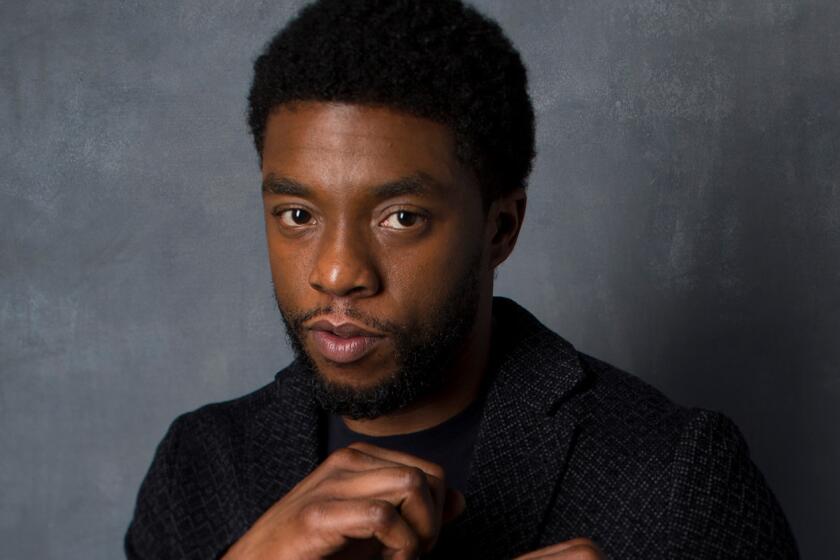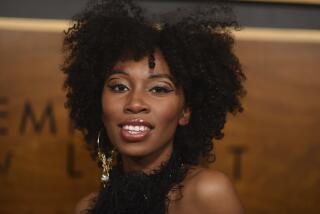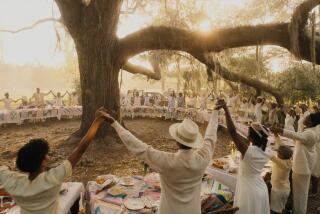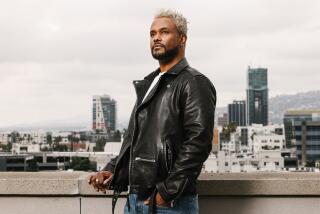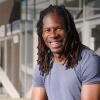Appreciation: Chadwick Boseman was more than an actor to Black audiences — he helped us breathe
Generally speaking, when Black people move to a new city there are two locations of the utmost importance — the new church home and the barbershop/hair salon. I recognize religion and grooming aren’t exclusive to any one group, but please allow me to share why these two spots play a unique role for many in the Black community. And why Chadwick Boseman wasn’t just another actor to us.
Humans can swim underwater but we must either hold our breath or bring oxygen with us. When holding our breath is no longer feasible or our tanks run low on air, we must find a way to replenish the oxygen lest we die. For many Black people — particularly those who repeatedly find themselves as “the only one” — being in America can sometimes feel like swimming underwater.
Church and the beauty shop are where we go to get oxygen, which is one of the reasons why we spend so much time there. My husband, who happens to be white, is comfortable going to any chain barbershop in any strip mall in any city. I, on the other hand, am far more selective.
I’m not going just to get my locs retwisted.
I’m coming up for air.
When I eventually found my spot in Los Angeles, I could feel the tension I subconsciously carry in my shoulders noticeably dissipate as I walked through the door. I didn’t feel the need to explain my Blackness or code switch in order to justify my existence. I, and the other patrons, were breathing freely ... naturally ... fearlessly.
After the release of “Black Panther,” I nicknamed that salon “Wakanda,” the fictional African nation in which Boseman’s T’Challa served as king. I called it Wakanda so often my stylists Aklia and Tina gave me a T-shirt that read “Wakanda Forever.” My mother goes to the shop. My son. Whenever my Black friends relocate to L.A. and ask where to get their hair done, I send them to Wakanda.
They won’t find vibranium, but they will find air.
Actor Chadwick Boseman, who played real-life icons Jackie Robinson and James Brown before finding fame as the regal “Black Panther” in the Marvel Cinematic Universe, has died of cancer.
Although it was released in 2018, “Black Panther” remains a source of pride for many Black people because representation matters — even in the land of make-believe — because it allows our children to dream in technicolor. Boseman’s loss hurts so much because whether in the land of make-believe or in real life, he represented us, and the culture, so well. His last tweet encouraged his followers to vote. His commencement speech at his alma mater, Howard University, quoted scripture as he implored the new graduates to live a life of purpose.
At the conclusion of his interview on “Popcorn with Peter Travers,” Boseman sang Bill Withers’ classic “Grandma’s Hands” with such richness and familial understanding it sounded like a Jacob Lawrence painting.
Grandma’s hands clapped in church on Sunday morning
Grandma’s hands played the tambourine so well
Grandma’s hands used to issue out a warning
She’d say, “Chad don’t you run so fast, might fall on a piece of glass, might be snakes there in that grass”
Grandma’s hands.
At one point “Black Panther” was one of the 10 highest-grossing films of all time, serving as the final death knell to the antiquated belief a predominately Black cast wasn’t marketable globally. Schools took field trips to see the movie in theaters because administrators recognized inspiration comes in many forms. Consider this: Films from the Marvel Cinematic Universe have grossed north of $22 billion worldwide, but its first three Oscars came courtesy of the world Boseman helped create.
Now Kevin Feige, president of Marvel Studios, must find a way to continue the legend of Black Panther without its iconic leading man, although one could argue the urgency to tell T’Challa’s story is secondary to another.
As Jackie Robinson, James Brown, Thurgood Marshall and King T’Challa, Chadwick Boseman commanded the screen with charm, skill and uncommon grace.
Legacy is a complicated concept because, to paraphrase from the equally transcendent “Hamilton,” we have no control over who lives, who dies, who tells our story. The legacies of James Brown, Thurgood Marshall and Jackie Robinson were all in good hands, in part because Boseman was there to help tell them. And now it is time to tell his. For just as Hollywood executives found value in the gone-too-soon narratives of Judy Garland, Marilyn Monroe and James Dean, the tale of a young boy from a small South Carolina town of less than 30,000 making his way to Oxford before becoming a global superstar is also worthy of a biopic.
It could not have been easy being viewed by millions around the world as a hero simply for portraying a fictional one, but Boseman embraced that burden with the same temperament emulated on screen: with dignity and grace. Despite being diagnosed with colon cancer in 2016, he continued pressing to tell powerful stories that the film industry had previously ignored — that of Thurgood Marshall, Black Vietnam veterans, legendary Blues singer Ma Rainey. In his commitment to portraying Black excellence he exemplified it while never hesitating to use his platform to encourage everyone to pursue the excellence within themselves.
Whenever I would see him at my neighborhood gym, we would exchange acknowledgments. One day I saw him while wearing that Wakanda T-shirt and we shared a laugh. King T’Challa may not be real, but for those of us accustomed to holding our breath, his influence was very much so. In that brief moment of laughter, my shoulders relaxed, my heart filled with pride as my lungs filled with air. I wasn’t starstruck. I wasn’t breathing underwater. I was in Wakanda ... paying respect to its king.
More to Read
The biggest entertainment stories
Get our big stories about Hollywood, film, television, music, arts, culture and more right in your inbox as soon as they publish.
You may occasionally receive promotional content from the Los Angeles Times.
